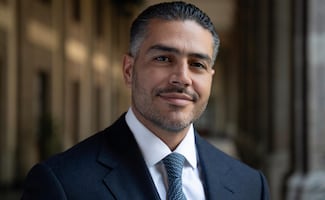Más Información

New York Times destaca rol de Harfuch en el combate del narco; resalta intercambio de inteligencia con EU

Marco Rubio destaca labor de seguridad de México; "están haciendo más que nunca en su historia", afirma

"Queremos cerrar este capítulo", dice Salinas Pliego al SAT; esperarán a enero a conocer fundamentos legales de adeudo fiscal
In the port city of Baltimore, where Europeans once streamed into America after crossing the Atlantic by ship, a 47-year-old immigrant named Rhonda is in a desperate position. She said she wants to provide for her teenage daughter but cannot get a work permit because she is in the United States illegally.
"I'd like, as a parent, to provide for my daughter's needs. Homelessness and moving around has been rough," said Rhonda, a native of Trinidad and Tobago who has lived in the United States since 2001 and spoke on condition that her last name not be used to protect her daughter.
In Houston, Daniel Castillo Garcia said he is apprehensive about his toddler son's future because the 19-year-old Mexican native is in deportation proceedings after being picked up by U.S. federal agents near the border.
"I'm very worried for my son because I need to provide for him," said Garcia, who has lived in the United States since being brought into the country by his mother as a child in 2007.
For these two and many others like them, perhaps their only realistic hope is that the U.S. Supreme Court revives President Barack Obama's 2014 executive action on immigration, which was thrown out by a lower court.
That plan was designed to let roughly 4 million people - those who have lived illegally in the United States at least since 2010, do not have a criminal record and have children who are U.S. citizens or lawful permanent residents - get into a program that shields them from deportation and supplies work permits.
Rhonda's 16-year-old daughter and Garcia's 2-year-old son are citizens by virtue of being born in the United States.
The court hears the case on Monday and is due to rule by the end of June.
Rhonda said she cannot get a work permit because she overstayed her original 10-year visa. She and her daughter are staying in temporary housing provided by her church because she has no income. For a year, she was separated from her daughter, who plays the violin and hopes to attend college, because they could find nowhere to live together.
'VERY ANXIOUS'
Rhonda, who said her Christian faith keeps her positive, believes work authorization would make the difference because employers increasingly demand such documentation.
"That's why I'm in such hardship. I'm very anxious for something to happen," she said.
In Baltimore's heavily Latino Fell's Point neighborhood, South Broadway is lined with store fronts advertising services in Spanish, ranging from tax preparation to cellphone providers. Catholic Charities runs an immigrant resource center offering legal advice as well as education and health services.
Its managing attorney, Adonia Simpson, said about half the roughly 600 people she counsels annually have no option beyond Obama's program, known as Deferred Action for Parents of Americans and Lawful Permanent Residents (DAPA), if they want to legalize their status and get work permits.
Initial enthusiasm about Obama's plan waned when a federal judge put it on hold in February 2015, just before it was due to begin. All Simpson can do for now is ask clients to gather documentation to be ready to apply.
"The community is getting very discouraged," Simpson said.
In Maryland alone, about 56,000 people could be eligible for the DAPA program, according to the Migration Policy Institute think tank.
Obama's plan was challenged by Texas and 25 other states that argued he exceeded his authority in bypassing Congress to take the actions.
"The president has violated the Constitution, and we are trying to prevent the president from implementing executive action that we believe is lawless," Republican Texas Attorney General Ken Paxton said.
The Supreme Court is hearing the case at a time when immigration has become a hot issue in the U.S. presidential campaign, with top Republican contenders calling for all illegal immigrants to be deported. An estimated 11 million immigrants are in the country illegally.
In Houston, Garcia has pinned his hopes on the court reinstating Obama's program.
"DAPA will help me get that freedom and help me to keep going and have a good future for myself and my son," Garcia said in an interview translated from Spanish by his attorney.
Noticias según tus intereses
[Publicidad]
[Publicidad]











